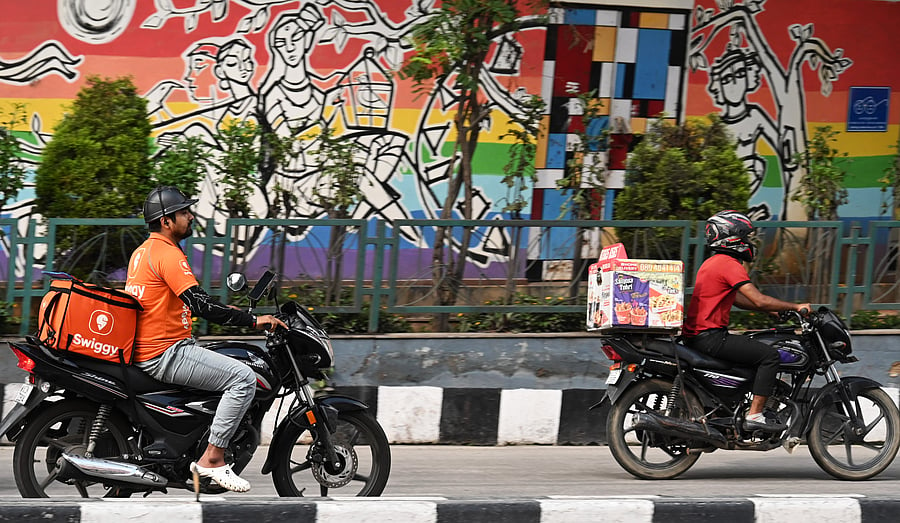
Bengaluru police is drafting SOPs for quick commerce firms to follow for delivery staff onboarding.
Credit: DH FILE PHOTO
Bengaluru: Over the past few years, Bengaluru has witnessed a worrying pattern of crimes involving quick commerce delivery agents. In an attempt to rein in the largely unorganised sector, the Bengaluru City Police is contemplating segregating and documenting incidents involving gig workers.
Bengaluru City Police Commissioner Seemant Kumar Singh has ordered a station-wise review and compilation of registered cases involving delivery agents, with a focus on crimes against women.
The recent case of a Brazilian model being allegedly molested by a delivery agent at her apartment raised concerns over the safety risks involved while using quick commerce platforms. The accused, a 21-year-old diploma engineering student, was later arrested by RT Nagar police and remanded in judicial custody.
Speaking to DH, Seemant Kumar Singh emphasised the importance of background verification before hiring delivery agents. “Verification is important in cases of cross-employment, where a worker leaves one organisation to immediately join another,” said Singh, adding that verification of the employee’s work history and police records will soon be made mandatory on quick commerce platforms.
For those working round the clock, companies have been asked to maintain proper safety setups, including GPS-based delivery tracking, area-wise delivery logs, and the employee’s active contact number.
“This is a fairly new employment sector and the numbers are growing by the day. Documentation is imperative. What we’ve noticed is that delivery agents are often using vehicles that are not registered in their names. The concerned organisations need to take onus, and these things need to be looked into. We plan to crack down on these issues,” said Kuldeep Kumar Jain, Joint Commissioner of Police (Administration).
Verification process
Most quick commerce companies depend on third-party organisations for background verification, shared an industry insider. “However, it is often not a detailed background check and just covers the basics,” he added.
Sharing details about the hiring and verification process at Zomato and Blinkit, a spokesperson said, “Before onboarding, every delivery partner undergoes a comprehensive background verification process conducted by independent background-screening partners, including detailed checks of eCourt and criminal records to ensure no serious offences are associated with the individual. They must also meet essential requirements such as possessing a verified government-recognised ID, a valid bank account, and two-wheeler riding proficiency. Beyond these requirements, our systems are designed to detect impersonation attempts or fake documentation, and once verification is complete, delivery partners receive extensive training on delivery protocols, safety, and hygiene standards to ensure they are fully prepared to operate on our platforms.” Additionally, post-onboarding, regular monitoring is conducted, they said.
However, the reality on ground remains different. To join a quick commerce platform as a delivery agent, all the documentation that is required is a valid government ID such as an Aadhaar card for address proof and a driver’s license.
“Once you download the app meant for delivery agents and provide these two documents, you’re almost immediately onboard. It’s an instant sign-up process. They use the Aadhaar card to check whether I have previously worked on the platform and if I’ve been blacklisted. Apart from that, once you are online on the platform, you are asked for a selfie at a random point during the day to verify the individual and check if the agent is wearing the appropriate uniform,” explained Rajesh (name changed), who attempted food delivery service on Zomato as a part-time job last year.
Gig workers work on a ‘to each their own’ principle, with little to no interaction with company officials on a daily basis, delivery agents told DH. Vinay Sarathi, president of United Food Delivery Partners’ Union, highlighted the need for quick commerce platforms to proactively take accountability for the safety of both female delivery agents and customers.
Swiggy has not yet responded to DH's queries.